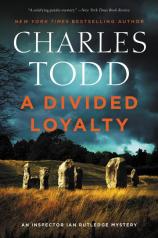A Divided Loyalty: An Inspector Ian Rutledge Mystery
Review
A Divided Loyalty: An Inspector Ian Rutledge Mystery
“Chief Superintendent Markham had known what he was doing when he sent Rutledge to the stones. There was nothing here to find. Except for failure.”
Regular readers of Charles Todd's stellar Inspector Ian Rutledge series know that his heart hasn't really been in the game lately. World War I is over, yet Rutledge still bares the mental scars from both that and his years as an Inspector at Scotland Yard. It seems pointless that Markham would set Rutledge up for failure when there is an unopened letter of resignation from Rutledge sitting in his side desk drawer. But this is where Rutledge finds himself. The way he sees it, the murdered woman was “someone's daughter. Someone's mother. Possibly someone's wife. What brought her here to die?”
Allow me to give you some backstory, which provides the reasoning for all of this. It's February 1921. World War I has been over for nearly three years, yet for Rutledge and many other veterans, they are still fighting that brutal war in some way. In fact, some of my favorite moments in these novels is Rutledge's discussions with Hamish McLeod. Rutledge is the only person who can see or hear Hamish. He is a ghost from Rutledge's experience in WWI, and the talks they have are some of the most interesting and telling in this series. It seems that readers have found out more about Hamish --- as well as Rutledge --- with each passing installment, no matter how quick or seemingly benign the subject matter of their conversations may be.
"A DIVIDED LOYALTY finds Rutledge at his most vulnerable and persistent, and it is this dichotomy that gives the book its character and tense atmosphere."
Hamish makes several appearances in A DIVIDED LOYALTY, probably because Rutledge is once again at a moral crossroads and in need of guidance --- or someone to take his hand and show him the right road on which to travel. At the book's opening, we see Rutledge and Chief Inspector Leslie crossing on the front steps to Scotland Yard. It is just after this brief encounter that we find them sent off on different assignments.
Leslie is to investigate the murder of a young woman in Avebury, her body found at the base of a large vertical statue of rock. If you have seen or read the Outlander series, you will recognize these stones, typically found in some circular pattern, similar to the larger ones in Stonehenge. Meanwhile, Rutledge is sent to Shropshire where the body of a young lady is found at the bottom of an open grave. She appears to be a stranger to this town, and it is obvious that she was murdered at another location and then placed in the open grave. Leslie is not able to get anywhere with his case, as it seems that the residents refuse to yield any of their secrets.
Rutledge's case begins to cross with the events in Leslie's, and it is just a matter of time before Markham pulls Rutledge to handle the higher profile murder in Avebury. Rutledge briefly chats with Leslie to make sure that there are no hurt feelings, and Leslie is happy to turn things over to another set of eyes as he has come up empty. It is not too long into Rutledge's investigation that he notices something that might indicate Leslie could know more about what happened there than he actually has let on.
Things begin to snowball slightly in the case, but still not enough to show who might be the guilty party. It will require a much deeper investigation into a town that has no reason but to remain close-lipped and hide their deadliest secrets. It is here where we find those moral crossroads providing the dilemma that gives the novel its title. If Rutledge perseveres and comes up empty, then Markham will have reason to knock him down quite a few notches at work. If instead he agrees with Leslie's admission that there was nothing to find, then he can merely hang his head in shame at work. On the other hand, if the Rutledge we have all grown to know and care for decides to stand up for the victim, a young woman who has no other voice to defend her, then he possibly risks it all if things end in failure.
A DIVIDED LOYALTY finds Rutledge at his most vulnerable and persistent, and it is this dichotomy that gives the book its character and tense atmosphere. It is an intense ride to take with him, but one that is well worth it.
Reviewed by Ray Palen on February 14, 2020
A Divided Loyalty: An Inspector Ian Rutledge Mystery
- Publication Date: January 5, 2021
- Genres: Fiction, Historical Fiction, Historical Mystery, Mystery
- Paperback: 352 pages
- Publisher: William Morrow Paperbacks
- ISBN-10: 0062905546
- ISBN-13: 9780062905543




